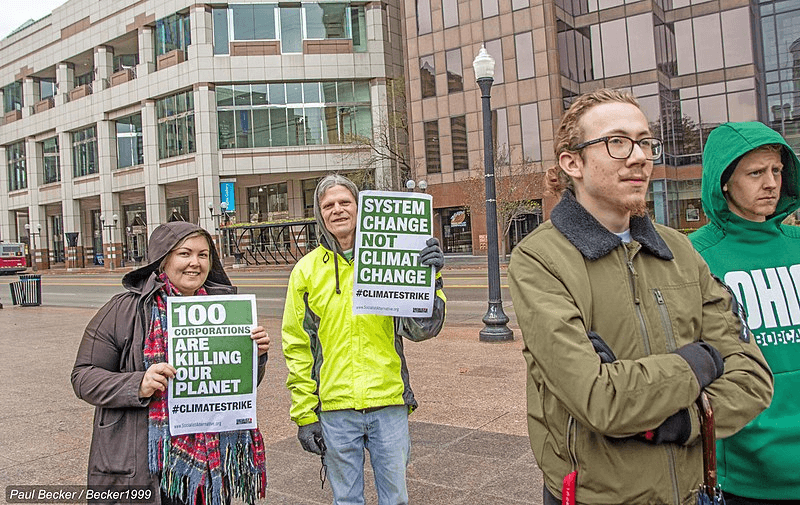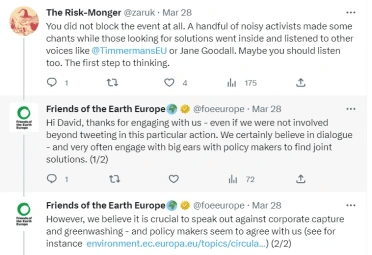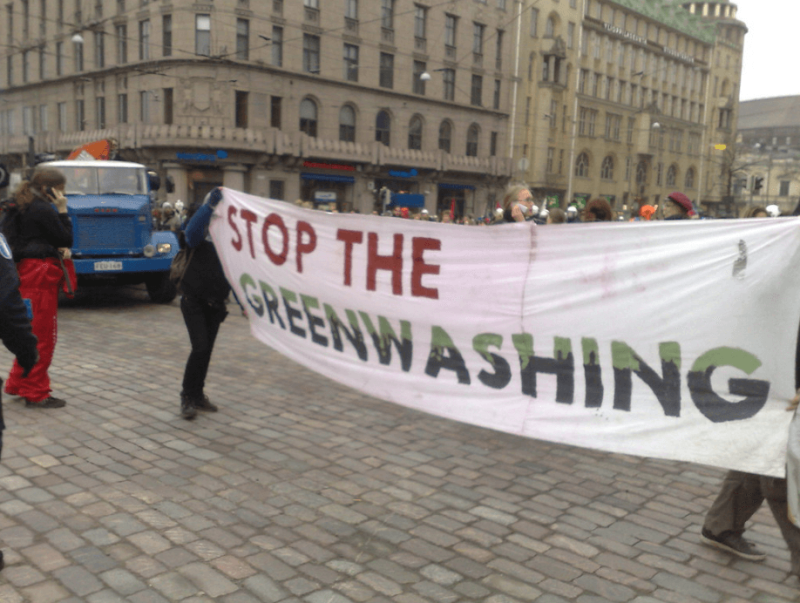Is greenwashing only an ‘industrial disease’? Just corporations? Just industry? The European Commission makes that clear. In their short press release for the publication of their draft Directive, they mention the word “company” seven times in reference to greenwashing.

What about all of the false claims made by environmental NGOs? What about governments? There is a lot of lying going on, but the claims by governments and NGOs that their green bullshit doesn’t equally stink is highly hypocritical. Why is this European Commission Directive only targeting companies and not the real greenwashers?
The European Commission even went so far as to exclude considering industry inputs from their stakeholder consultations for this draft legislation. The document unashamedly states:
Moreover, most stakeholders consulted agreed that greenwashing is a problem, with the noticeable exception of industry representatives. More than half encountered misleading claims and expressed less trust in environmental statements and logos managed by companies or private entities. In addition, most respondents to the targeted consultations indicated that consumers lack awareness of the environmental impacts of products because the information is not provided or not available.
So they only considered stakeholder contributions from those who don’t like industry and believe that only industry greenwashes. Shouldn’t the European Commission have looked more seriously into why industry stakeholders did not think that greenwashing was a problem? Were they being pushed by some NGO lobbying to present an anti-industry legislation and then ignore the views of industry? I am sure NGOs would not consider their own greenwashing transgressions as a problem (and the European Commission did not even give that any thought in drafting this legislation).
Rather than greenwashing, I have been calling activist lies on environmental sustainability as: “green hypocrisy”. But the goal is the same: getting you to buy their product based on a lie. And a “product” is not just a T-shirt made from recycled ocean plastics (ie, woven fishing nets), but also a request for a donation to keep an NGO campaign going or a ploy to earn trust (and therefore votes in the next election). Donations and trust are also products cleverly marketed and where greenwashing is an important issue.

The Green Virtue Game
Any marketer worth his or her salt knows that people want to consider themselves as ecological and sustainable; no one (except maybe the Risk-Monger) has the courage to stand up and admit “I pollute!”. So marketing geniuses work hard to try to portray their products, in every smell, taste and touch, as “eco-friendly”. And it allows people to package second-rate products sold off at a premium price. But this green marketing is everywhere, especially for NGOs and politicians, whose chief product they want you to buy into is themselves. Where is the government regulation to ensure that NGOs don’t make false claims about the ecological profile of their solutions, or to ensure that the Green Deal actions are actually going to do what these political legacy-builders say they will?
The European Green Deal is perhaps the most greenwashed product in the history of policy.
This green Kool-Aid has been brewed across global capitals with leaders using their political skills to posture themselves as caring, concerned and responsible leaders. The climate emergency has been played up in the media as an emotional struggle of good (your benign leader) versus evil (that industry whose products you buy). The Precautionary Principle (the institutionalisation of inaction) is a policy tool to justify how you are putting nature first. Surround yourself with some children, talk about their future and your re-election looks secure. And if a leader hesitates and considers other options (jobs, economic security, scientific facts, innovation…), the opposition will claim those green robes and express moral superiority (staking claim to the virtue of sustainability).
So it is with heroic hypocrisy that NGOs and the European Commission are playing the green virtue game and attacking only industry for doing what they have excelled at for decades – using charged environmental issues to cleanse their reputations to appropriate votes and donations. The fact that they are playing their hand by introducing a regulation to further play up their green virtue is stunning.
Here are some examples of where NGOs and government greenwashing is running rampant.
Net-zero green energy
The President of the European Commission, Ursula von der Leyen, recently declared that nuclear energy will not play a role in the green energy (decarbonisation) strategy. This is in reference to the European Commission’s quickly assembled (ie, asleep at the wheel) Net-Zero Industry Act. The Commission’s staff working document on Net-Zero technologies does not mention nuclear energy once. I suppose when they want to present themselves as green, they have to wash themselves entirely in wind and solar. But what do they mean by ‘Net Zero’?
Net Zero has made government greenwashing into a spectator sport. It is essentially playing with calculations of how carbon is emitted vs the energy consumed (wasted) to get to claim some mythical equilibrium. It sounds very heart-warming to say that there are no net emissions in one’s activities but is there such a thing as Net Zero? Saying you are using solar panels to charge your electric cars somehow gives you a free pass from honestly calculating all of the CO2 emissions to manufacture, maintain and recycle the panels, batteries, vehicles and components. Did you really need that electric car or that huge house, Frans? Corners are easily cut, the green is washed, rinsed and repeated.
From the Net-Zero Industry Act staff working paper we at least found one blissful moment of honesty:
In light of the above it becomes apparent that, while funding possibilities have recently increased, the current EU budget has insufficient possibilities for supporting the objectives of the Net-Zero Industry Act and for ensuring a level-playing field between Member States, relative to the identified public investment needs.
Translation: Everything the European Commission plans to do to reach “Net Zero” will merely be political posturing. If that is not greenwashing to make Frans and Ursula’s Green Deal legacy stick, then I don’t know what is.
Net Zero, if we were honest, would be to concentrate on taking carbon out of the atmosphere. Governments don’t want to use this definition as it limits creativity but companies are working on that with their developments in carbon capture and storage (CCS). Governments and NGOs are trying to diminish this CCS approach as it might reverse their efforts to denormalise the fossil-fuel industry. So instead they pollute more and greenwash harder. Scrub-scrub-scrub.

Plastics
With the number of products containing ocean plastics on the shelves, it is a wonder there is any plastic left in the ocean. But the people planting this perception are at least admitting that plastics are important consumer products. Those campaigning against their sustainability and calling for a total ban of all plastics are the real greenwashers.
When the French government passed a law demanding to phase out plastic packaging of fresh fruit and vegetables, I thought “Oh dear, looks like I will be consuming less fresh produce.” Take the simple cucumber. With a few grams of plastic clingfilm, the fresh vegetable can last in my fridge for around 14 days. Without any packaging, it starts to spoil within three days. As the Risk-Monger only goes down to his shop once a week, he has stopped adding cucumbers to his salad (and prices for off-season cucumbers have risen dramatically due to how the supermarkets now have to throw out what they cannot sell in days rather than weeks).
The Green Lobby is full of anti-plastic greenwashing claims like glass bottles being better for the environment. How do they defend these claims given the increased weight, transportation costs and energy consumption to make, sterilise and reuse these “natural” products. Complete nonsense but since glass is not plastic, activists will not criticise their false green claims. And remember that video of the poor turtle with the straw up its nostril? Now we have waxed straws that cannot be recycled.
We forget that plastics were introduced as greener alternatives to animal products, deforestation and heavy metal manufacturing. We forget that plastics are easy to recycle via energy recovery while other products use more energy and water to reuse. We forget that plastic products protect human health (until a pandemic reminds us how essential they are). Those activists attacking plastics seem to forget their obsession with natural alternatives are not ecologically sound. In other words, they are greenwashing.
Organic food
When did the folktale claiming that organic food is better for the environment become accepted as fact? Organic has been the most fear-laden, fact-deficient, environmentally catastrophic marketing campaign in human history. Anyone who claims consuming organic food is better for the environment is greenwashing. Some examples:
- Lower yields on organic produce (around 40%, depending on region and crops) means more meadows and forests needing to be ploughed under to meet consumer demand.
- Organic-approved pesticides are often more toxic to the environment, beneficial insects, bees and human health.
- Lack of efficient organic-approved herbicides means organic farming cannot benefit from more sustainable farming practises like complex cover crops and no-till farming.
- Production of natural-based organic-approved pesticides takes fertile land out of food production (and often in developing countries).
- The organic food industry lobby’s rejection of new seed breeding technologies means organic farmers cannot utilise simple yield and crop solutions.
- Imposing arbitrary organic restrictions on developing country smallholders (under the political guise of agroecology) leads to more food vulnerability, impoverishment and child labour.
And the European Commission’s Farm2Fork Green Deal legislation is demanding that we shift to 25% organic farming land use by 2030. Impossible, dangerous, pure madness and blissful greenwashing. If the European Commission’s draft Green Claims Directive were to be honestly written and implemented, it would charge Frans Timmermans with lying and greenwashing.
A product of NGO lobbying
What is the point of this Greenwashing Directive? It is not to protect consumers (marketing is designed to always separate consumers from their money). It is not to protect those companies who have genuinely sustainable products (the report recognised that is what the EU labels will do and, in any case, we do not have a clear definition of “sustainable”). It is not a very good draft proposal, seems rushed and preoccupied.

This entire Directive was the response to years of massive anti-industry lobbying campaigns by environmental NGOs who could not tolerate the idea that any company or industry was claiming they could be considered ‘green’. For years these anti-corporate militants have been demanding action to stop companies from trying to profit from the green trust relations these NGOs had developed for themselves. For companies to invest in PR campaigns that claim to be green via buzzwords like Corporate Social Responsibility, Sustainable Development and now ESG just irks these NGOs to no end.
The draft Directive is of a very low quality and reflects the cynicism of the European fonctionnaires who wrote it was shining through. I suspect they were instructed from their hierarchy to produce something to make the green lobbyists camped outside their windows leave them alone. So they released this proposed legislation with the understanding that the regulatory process will clock out before the next European elections. A new, hopefully more reasonable Commission leadership will be confirmed in 2024 and this draft document will either likely be dropped or largely rewritten. In the meantime, groups like Friends of the Earth can go back to their funders and crow: “Look what we’ve done to continue to spread distrust of those you hate. Now give us more money!“. Indeed, this entire process is incredibly cynical and benefits no one.
A green Europe or a greener one?
When NGOs claim that companies greenwash, what they are saying is that no companies are green and you cannot trust a word they say. Being “Green” is a tick-box, a status, and companies don’t get one (unless they are tied to the organic or renewables industries and unless they donate to these NGOs). So this European Directive is designed to institutionalise this distrust of industry. NGOs want companies to just stop claiming they are green – they aren’t!
These environmental NGOs have influenced the European Commission to use an absolutist approach: either you are green (like them) or you are not (and thus like industry). If companies make a claim that their products are more sustainable, the NGOs will intervene in absolutist terms and claim that it is not, in itself, green enough. But in the corporate world, sustainability is a key element of product stewardship – a continuous process of product or system improvement.
Most innovative products then are less polluting than the previous ones made with older technologies due to innovations in processes and production methods – thus by industry standards, they are greener. Lifecycle assessments are continuously refining themselves. This is probably why industry inputs during the European Commission consultations for this regulation did not see greenwashing as a serious problem: striving in a continuous process to be greener is their definition of sustainability. The Commission should have looked into this rather than deciding to ignore industry, continue just with the NGO lobbyists to produce a biased draft based on an absolutist tick-box.

Under the NGOs’ absolutist approach, industries are not green and don’t merit the claims. One further hypocrisy though is that these NGOs use the progressive approach for technologies they support (like wind, solar, organic, glass…). This is nonsense.
The Green Claims Directive is bad legislation that should be abandoned.
The Industry Complex: Why the inaction?
And yet companies did not speak out. I can imagine that the various industry trade associations in Brussels raised their glasses at the press conference, saluting the European Commission for creating the means for a level playing field. Why didn’t industry call a spade a spade and insist that environmental NGOs also be subject to the same conditions? Why didn’t industry object to the isolation of themselves as the sole culprits? Why didn’t they intervene on the use of the NGO’s absolutist definition of what is green? Why didn’t they adopt a more realistic, process-oriented approach to greener products? Why did they allow the NGOs to use this meaningless legislation as a tool to further destroy trust in industry?
This is an example of the Industry Complex. As long as industry does not speak up, does not demand the same standards for all and allows the narrative that they cannot be trusted to continue to proliferate, then they will continue to suffer a diminished reputation, they will lose products and they will no longer have the right to market. The Green Claims Directive is a ridiculous regulation that will only further cement the distrust of industry. It does not provide mechanisms to call into question government or NGO claims who will not have their credibility systematically called into question (even though clearly there should be).
Industry greenwashes the same as green NGOs and governments, no more, no less. There are liars and opportunists out there – that is a fact of life. We know why NGOs and government actors lie, but what causes companies with ethical codes of conduct to try to deceive or misrepresent? Have these governments and NGOs created a regulatory framework that leaves companies with little option otherwise? As the European Commission sets so many unrealistic, aspirational goals as regulations (circular economy, Farm2Fork, Fit For 55 …), are they encouraging stakeholders to cheat in order to survive? Part 7 of the Industry Complex looks at how bad regulations can lead to bad behaviour in what I will call the Al Caponisation of Industry.
David Zaruk is a Belgian-based environmental-health risk policy analyst specializing in the role of science in policy and societal issues. He blogs under the pseudonym: The Risk-Monger. Follow him on Twitter at @zaruk































